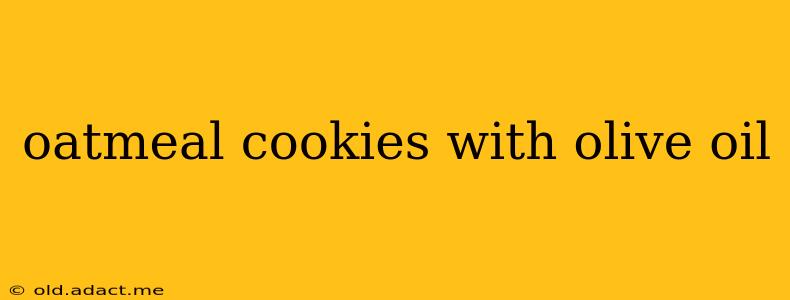Oatmeal cookies are a classic comfort food, beloved for their chewy texture and warm, comforting flavor. But have you ever considered using olive oil instead of butter or shortening? This seemingly unconventional swap yields surprisingly delightful results, creating cookies that are moist, subtly fruity, and boast a unique depth of flavor. This guide will explore the magic of olive oil oatmeal cookies, addressing common questions and offering tips for baking the perfect batch.
Why Use Olive Oil in Oatmeal Cookies?
The beauty of using olive oil lies in its unique properties. Unlike butter, which can solidify and create a denser cookie, olive oil retains its liquid state, contributing to a chewier, more tender crumb. The subtle fruity notes of the olive oil also add an unexpected layer of complexity to the familiar oatmeal cookie flavor profile, creating a surprisingly sophisticated treat. Choosing a high-quality extra virgin olive oil will amplify these positive characteristics, enriching the overall taste experience.
What Kind of Olive Oil is Best for Oatmeal Cookies?
H2: What kind of olive oil is best for oatmeal cookies?
While any olive oil will work, a high-quality extra virgin olive oil is recommended. Its fruitier notes will complement the oats and other ingredients, adding a pleasant depth of flavor. Avoid using olive oils with a strong, peppery taste, as this could overpower the other flavors in the cookie. A mild extra virgin olive oil with subtle fruity notes will provide the best balance.
Will Olive Oil Oatmeal Cookies Taste Like Olives?
H2: Will olive oil oatmeal cookies taste like olives?
No, the olive oil flavor is subtle and complementary, not overpowering. The fruity notes of the oil enhance the overall flavor profile of the cookie, adding a sophisticated twist rather than a distinct olive taste. The other ingredients—oats, brown sugar, spices—will still dominate the flavor profile, with the olive oil acting as an enriching element. Think of it as a subtle background note, adding depth and complexity without stealing the show.
How Do I Make Olive Oil Oatmeal Cookies?
A basic recipe might look like this (adjust quantities based on your preferred sweetness and texture):
- 1 cup rolled oats
- 1/2 cup all-purpose flour
- 1/2 cup brown sugar
- 1/4 cup granulated sugar
- 1/2 cup olive oil
- 1 large egg
- 1 teaspoon baking soda
- 1/2 teaspoon salt
- 1 teaspoon cinnamon
- 1/2 teaspoon vanilla extract
- 1/2 cup raisins or chocolate chips (optional)
Instructions:
- Preheat your oven to 350°F (175°C). Line baking sheets with parchment paper.
- Combine oats, flour, sugars, baking soda, salt, and cinnamon in a large bowl.
- In a separate bowl, whisk together the olive oil, egg, and vanilla extract.
- Add the wet ingredients to the dry ingredients and mix until just combined. Don't overmix.
- Stir in raisins or chocolate chips (if using).
- Drop by rounded tablespoons onto the prepared baking sheets.
- Bake for 10-12 minutes, or until golden brown.
- Let cool on the baking sheets for a few minutes before transferring to a wire rack to cool completely.
Are Olive Oil Oatmeal Cookies Healthier Than Traditional Oatmeal Cookies?
H2: Are olive oil oatmeal cookies healthier than traditional oatmeal cookies?
While not drastically healthier, olive oil does offer some nutritional advantages over butter. Olive oil is rich in monounsaturated fats, which are considered heart-healthy. However, the overall health benefits depend on the other ingredients used and portion size. The added sugar and other ingredients in any cookie should still be considered when factoring in overall diet and health. This recipe offers a slightly healthier alternative, not a radical transformation into a superfood.
Can I Substitute Other Oils for Olive Oil in Oatmeal Cookies?
H2: Can I substitute other oils for olive oil in oatmeal cookies?
Yes, you can experiment with other oils, but the flavor profile will change. Vegetable oil will produce a more neutral-flavored cookie, while coconut oil will impart a distinct coconut flavor. The texture might also vary depending on the oil’s properties. For the most consistent results that maintain the intended subtle fruity notes, sticking to a mild extra virgin olive oil is best.
By embracing this simple substitution, you can elevate your classic oatmeal cookie experience to a whole new level. So, grab your apron and embark on a culinary adventure with these surprisingly delightful olive oil oatmeal cookies. The results are sure to impress!
